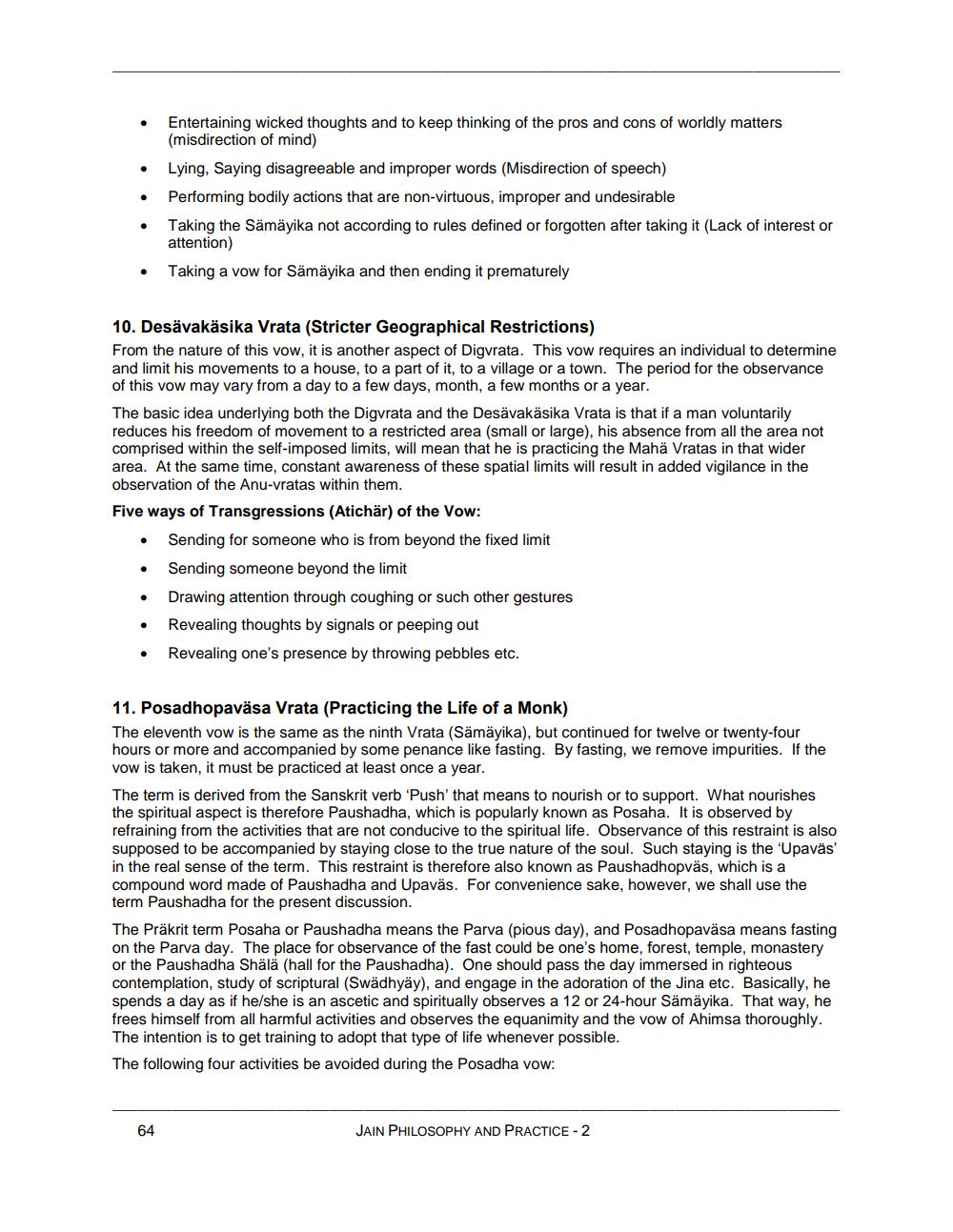________________
Entertaining wicked thoughts and to keep thinking of the pros and cons of worldly matters (misdirection of mind) Lying, Saying disagreeable and improper words (Misdirection of speech) Performing bodily actions that are non-virtuous, improper and undesirable Taking the Sämäyika not according to rules defined or forgotten after taking it (Lack of interest or attention) Taking a vow for Sämäyika and then ending it prematurely
•
10. Desävakäsika Vrata (Stricter Geographical Restrictions) From the nature of this vow, it is another aspect of Digvrata. This vow requires an individual to determine and limit his movements to a house, to a part of it, to a village or a town. The period for the observance of this vow may vary from a day to a few days, month, a few months or a year. The basic idea underlying both the Digvrata and the Desävakäsika Vrata is that if a man voluntarily reduces his freedom of movement to a restricted area (small or large), his absence from all the area not comprised within the self-imposed limits, will mean that he is practicing the Mahä Vratas in that wider area. At the same time, constant awareness of these spatial limits will result in added vigilance in the observation of the Anu-vratas within them. Five ways of Transgressions (Atichär) of the Vow:
Sending for someone who is from beyond the fixed limit Sending someone beyond the limit Drawing attention through coughing or such other gestures
Revealing thoughts by signals or peeping out • Revealing one's presence by throwing pebbles etc.
11. Posadhopaväsa Vrata (Practicing the Life of a Monk) The eleventh vow is the same as the ninth Vrata (Sämäyika), but continued for twelve or twenty-four hours or more and accompanied by some penance like fasting. By fasting, we remove impurities. If the vow is taken, it must be practiced at least once a year. The term is derived from the Sanskrit verb 'Push' that means to nourish or to support. What nourishes the spiritual aspect is therefore Paushadha, which is popularly known as Posaha. It is observed by refraining from the activities that are not conducive to the spiritual life. Observance of this restraint is also supposed to be accompanied by staying close to the true nature of the soul. Such staying is the 'Upaväs' in the real sense of the term. This restraint is therefore also known as Paushadhopväs, which is a compound word made of Paushadha and Upaväs. For convenience sake, however, we shall use the term Paushadha for the present discussion. The Präkrit term Posaha or Paushadha means the Parva (pious day), and Posadhopaväsa means fasting on the Parva day. The place for observance of the fast could be one's home, forest, temple, monastery or the Paushadha Shälä (hall for the Paushadha). One should pass the day immersed in righteous contemplation, study of scriptural (Swadhyäy), and engage in the adoration of the Jina etc. Basically, he spends a day as if he/she is an ascetic and spiritually observes a 12 or 24-hour Sämäyika. That way, he frees himself from all harmful activities and observes the equanimity and the vow of Ahimsa thoroughly. The intention is to get training to adopt that type of life whenever possible. The following four activities be avoided during the Posadha vow:
64
JAIN PHILOSOPHY AND PRACTICE - 2




